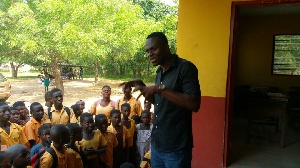The Centre for Energy, Environment, and Sustainable Development (CEESD), a non- for -profit organization, has provided a One kilowatt (kW) solar power system for Faaso Battor Community School in the Kwahu Afram Plains North District.
The Project which is being funded by the United States Africa Development Foundation (USADF) is expected to increase teaching and learning hours for pupils and also provide power for Information Technology Communication (ICT) training within the community.
Dr Julius Cudjoe Ahiekpor, the Executive Director, CEESD, said the importance of electricity in the development of any country could not be overemphasised, particularly in the educational sector.
He said the project would provide several benefits to the community as pupils would have extended learning hours and teachers could also have enough time to prepare lesson notes, adding that “they can now use the ICT facilities provided by the Ghana Education Service”.
Dr Ahiekpor said CEESD and USADF would be providing 13kW solar electricity to the entire Faaso Battor Community, however, the presentation of one kW to the school was the first phase of the project.
He said in subsequent phases of the project, the community would benefit from an installation of a two kW solar systems for the community health post and a 10 kW system for households.
Mr Alfred Dickson Bedzina, the Head Teacher, Faaso Battor Community School, on behalf of the Community, thanked CEESD and its partners for their kind gesture and was hopeful that the project would improve the academic performance of the students.
In an interview with the Ghana News Agency, Mr Bedzina said CEESD’s project would improve their academic performance as Faaso Battor was a rural community and there was no light for children to learn in their various homes.
Mr Bedzina told the GNA that in that regard, the school would soon organise evening classes for pupils as part of efforts to promote teaching and learning.
“With the availability of electricity, all children can come from their homes and learn for at least an hour or one and half hours,” he stated.
The Head Teacher said there was no portable drinking water in the community and particularly during the dry season children find it difficult to get water.
He appealed to non-governmental organisations and benevolent individuals to help drill bore holes in the community.
General News of Saturday, 18 November 2017
Source: ghananewsagency.org

















